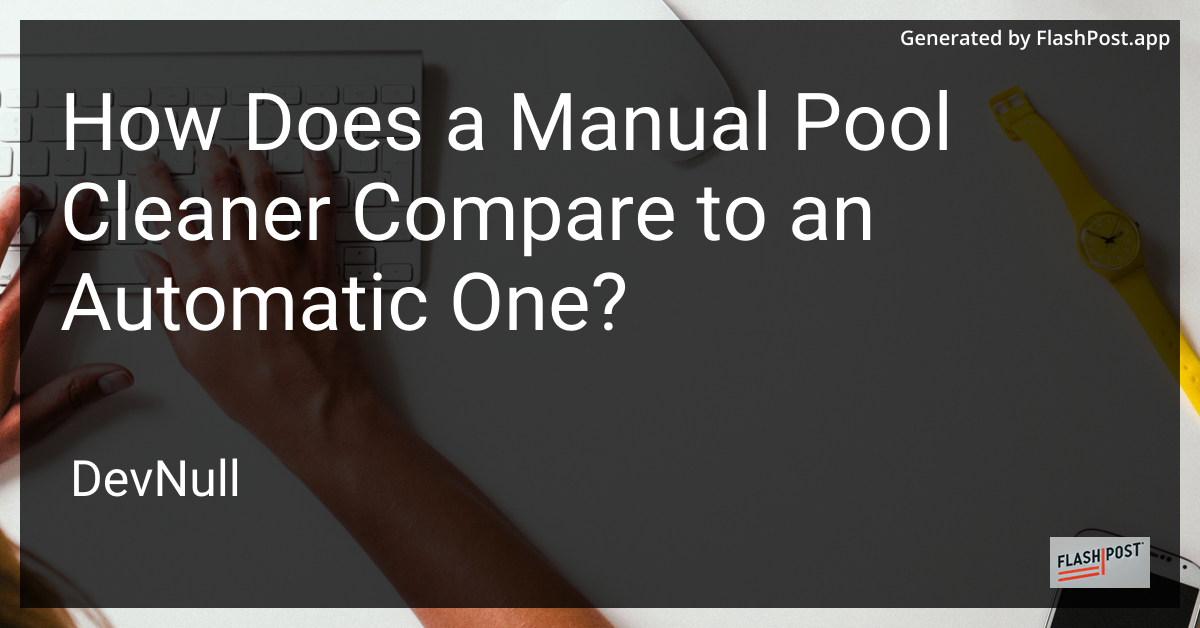

How Does a Manual Pool Cleaner Compare to an Automatic One?
Maintaining a sparkling clean pool requires the right equipment and consistent care. Pool owners often debate whether to opt for a manual pool cleaner or invest in an automatic one. Each type has its own benefits and drawbacks, impacting factors such as cost, convenience, and efficiency. This article aims to help you navigate these considerations and make an informed decision for your pool maintenance needs.
Manual Pool Cleaners: Pros and Cons
Pros of Manual Pool Cleaners
-
Affordability: Manual pool cleaners are generally more budget-friendly than their automatic counterparts. They often have lower upfront costs and fewer components that may require replacement.
-
Control: With a manual pool cleaner, you have direct control over the cleaning process. This allows you to target specific areas of your pool, including corners and steps that automatic cleaners might miss.
-
Low Maintenance: Manual pool cleaners have fewer moving parts, reducing the likelihood of malfunctions. They require minimal maintenance, usually limited to regular cleaning and occasional part replacement.
Cons of Manual Pool Cleaners
-
Time-Consuming: Cleaning your pool manually can be labor-intensive and time-consuming. It requires physical effort and can take several hours, depending on the pool’s size.
-
Efficiency: Manual cleaning may not be as efficient as automatic cleaning, as it relies on human effort and attention to detail. Achieving a thorough clean can require significant manual labor.
-
Skill Requirement: Effective manual cleaning requires some skill and experience to ensure thoroughness. It may not be the best option for those new to pool maintenance.
Automatic Pool Cleaners: Pros and Cons
Pros of Automatic Pool Cleaners
-
Convenience: Automatic pool cleaners offer unbeatable convenience, allowing you to sit back while the device takes care of the cleaning. They operate independently and can be set on a schedule, ensuring a consistently clean pool.
-
Efficiency: These cleaners often use advanced technology to cover every inch of your pool, including walls and hard-to-reach spots. They are designed to be efficient and effective in removing debris.
-
Time-Saving: Since automatic cleaners do the work for you, you can save valuable time and spend it enjoying your pool rather than maintaining it.
Cons of Automatic Pool Cleaners
-
Cost: Automatic pool cleaners tend to be more expensive, both in terms of the initial purchase and potential maintenance costs. The technology can involve higher upfront investment compared to manual options.
-
Complexity: Automatic cleaners have more components and complexity, which can lead to more frequent repairs or part replacements, adding to long-term maintenance costs.
-
Less Control: Unlike manual cleaners, automatic devices may miss certain spots or struggle with complex pool shapes, requiring occasional manual intervention for a pristine pool.
Conclusion: Which is Right for You?
Choosing between a manual pool cleaner and an automatic one depends on your budget, time availability, and personal preferences. If you enjoy hands-on tasks and want to save money, a manual cleaner could be your best bet. However, if convenience and efficiency are your priorities, investing in an automatic cleaner might be the way to go.
For more guidance on selecting the right pool cleaner for your needs, visit Pond Doc’s guide to pool cleaner selection.
Maintaining a clean pool doesn’t have to be a daunting task. With the right tools and knowledge, you can ensure your pool remains a refreshing retreat all summer long.
